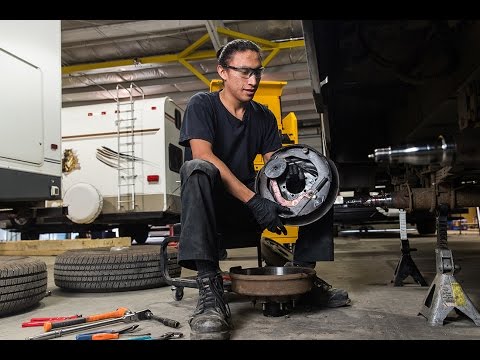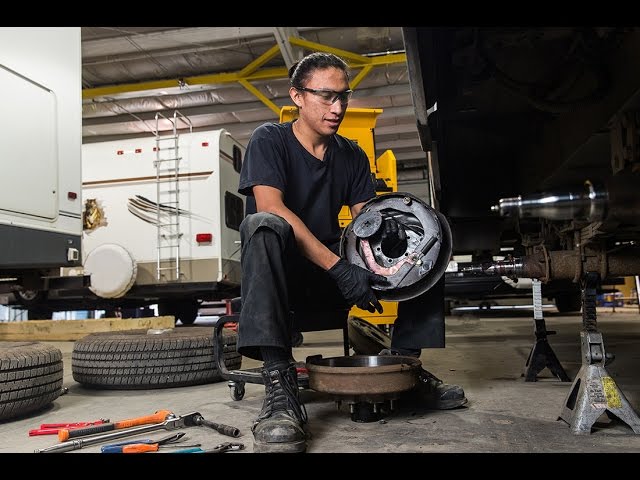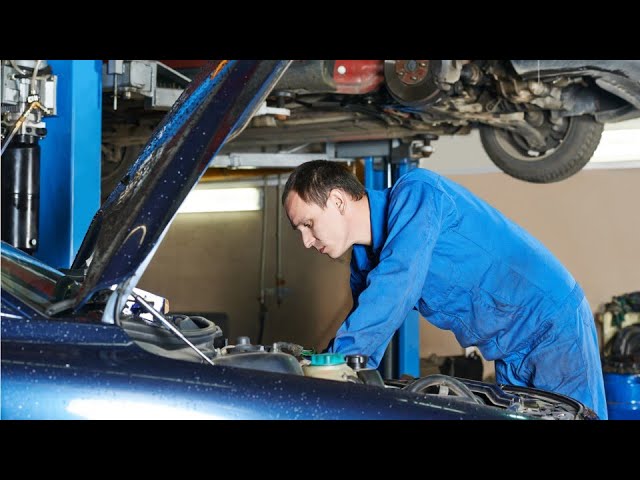If you have a knack for mechanical skills and a passion for RVs, consider becoming a recreation vehicle service technician. In this role, you will be responsible for installing, repairing, and maintaining various components on motor homes, trailers, and campers. As a technician, you will work closely with a team, problem-solving and tackling a wide range of issues to ensure that recreational vehicles are in top-notch condition for their owners.
To excel in this field, you will need to have a diverse skill set that spans across plumbing, electrical work, carpentry, and more. As you progress in your career, you may have the opportunity to take on more responsibilities and even mentor apprentices. If you enjoy a challenge and take pride in helping others enjoy their leisure time, a career as a recreation vehicle service technician may be the perfect fit for you.

Overview of Recreation Vehicle Service Technician
Definition of Recreation Vehicle Service Technician
A Recreation Vehicle Service Technician is a professional responsible for installing, repairing, and maintaining interior and exterior components on various recreational vehicles such as motorhomes, travel trailers, fifth wheel trailers, truck campers, tent trailers, and van conversions. They have a diverse set of mechanical skills essential for the upkeep of a wide range of RVs.
Responsibilities of a Recreation Vehicle Service Technician
The primary responsibilities of a Recreation Vehicle Service Technician include conducting repairs and maintenance on various components of RVs, troubleshooting mechanical issues, ensuring the safety and functionality of all systems, working closely with customers to understand their needs, and maintaining a clean and organized workspace for efficient work operations.
Work Environment
Recreation Vehicle Service Technicians typically work in repair shops, dealerships, or as mobile service providers. The work environment can vary from indoor repair bays to outdoor settings such as campsites. Technicians in this field often work collaboratively with other team members to address complex issues and provide comprehensive solutions. Safety is a top priority in this profession, and technicians are required to adhere to strict safety protocols and wear appropriate personal protective equipment (PPE) while working.
Career Outlook
The career outlook for Recreation Vehicle Service Technicians is promising, with a growing demand for skilled professionals in the field. As more people invest in recreational vehicles for travel and leisure, the need for qualified technicians to repair and maintain these vehicles is on the rise. Career advancement opportunities are available for technicians who demonstrate proficiency in their work and seek additional training for specialization in specific areas of RV maintenance.
Skills Required for a Recreation Vehicle Service Technician
Mechanical Skills
A Recreation Vehicle Service Technician must possess excellent mechanical skills to diagnose and repair various components of recreational vehicles. Proficiency in using a wide range of tools and equipment is essential for performing intricate repairs and ensuring the proper functioning of all systems.
Problem-Solving Abilities
The ability to identify and troubleshoot mechanical issues is a crucial skill for Recreation Vehicle Service Technicians. They must possess strong problem-solving capabilities to address complex maintenance tasks and find effective solutions to ensure the safe operation of recreational vehicles.
Attention to Detail
Attention to detail is vital in the work of a Recreation Vehicle Service Technician. From inspecting components for wear and tear to following technical manuals for repair procedures, attention to detail ensures that every aspect of maintenance is carried out accurately and efficiently.
Customer Service Skills
Effective communication and customer service skills are essential for Recreation Vehicle Service Technicians who interact with RV owners regularly. Technicians must be able to explain repair processes to customers, address their concerns, and provide excellent service to ensure customer satisfaction.
Training and Education
Apprenticeship Program
Many Recreation Vehicle Service Technicians begin their careers by joining an apprenticeship program. These programs typically last three years and include a combination of on-the-job training and technical education. Apprentices work under the guidance of experienced technicians to learn the practical skills and knowledge necessary for the profession.
Technical Training
In addition to on-the-job training, Recreation Vehicle Service Technicians often receive technical education from vocational schools or community colleges. These programs provide a comprehensive understanding of RV systems, maintenance procedures, and safety protocols to prepare technicians for successful careers in the field.
On-the-Job Training
Continuous on-the-job training is a key component of a Recreation Vehicle Service Technician’s career development. As new technologies and systems emerge in the RV industry, technicians must stay updated on the latest advancements and undergo training to enhance their skills and knowledge.
Career Development and Advancement
Progression from Apprentice to Journeyman
After completing an apprenticeship program, Recreation Vehicle Service Technicians advance from apprentices to journeyman technicians. Journeyman status signifies a higher level of skill and experience, allowing technicians to take on more complex repair tasks and mentor aspiring apprentices in the field.
Potential Advancement Opportunities
Recreation Vehicle Service Technicians have various opportunities for career advancement, such as becoming service managers, foremen, or even transitioning into sales roles within the RV industry. Advancement opportunities are available to technicians who demonstrate dedication, proficiency, and a passion for continual learning and improvement.
Continued Learning and Skill Development
To excel in the field of Recreation Vehicle Service Technology, technicians must engage in continuous learning and skill development. Staying updated on the latest RV technologies, attending training programs, and seeking certification in specialized areas of RV maintenance are essential for career growth and advancement.

Tools and Equipment Used
Range of Tools Required
Recreation Vehicle Service Technicians utilize a wide range of tools and equipment to perform maintenance and repairs on recreational vehicles. These tools may include wrenches, screwdrivers, diagnostic equipment, power tools, and specialized instruments for working on various components of RVs.
Organization and Maintenance of Tools
Proper organization and maintenance of tools are essential for efficient workflow in the RV service industry. Technicians must keep their tools clean, organized, and in good condition to ensure they are readily available when needed for repairs and maintenance tasks.
Safety Equipment
Safety is a top priority in the work of Recreation Vehicle Service Technicians. Technicians are required to use personal protective equipment (PPE) such as steel-toe boots, face masks, welding shields, eye protection, and ear protection to prevent injuries and ensure a safe working environment while handling tools and equipment.
Work Environment and Safety
Safety Protocols and Procedures
Recreation Vehicle Service Technicians follow strict safety protocols and procedures to prevent accidents and injuries in the workplace. Adhering to safety guidelines, using proper equipment, and maintaining a clean and organized workspace are essential practices to ensure a safe work environment.
PPE Requirements
Personal Protective Equipment (PPE) is mandatory for Recreation Vehicle Service Technicians to protect themselves from potential hazards while working on RVs. Technicians must wear appropriate PPE, such as safety glasses, gloves, and protective clothing, to prevent injuries and maintain their well-being.
Teamwork and Collaboration
Collaboration and teamwork are essential aspects of the work environment for Recreation Vehicle Service Technicians. Technicians often work together to troubleshoot complex issues, share knowledge, and find solutions to challenging problems. Effective teamwork ensures efficient workflow and the successful completion of repair tasks.

Job Satisfaction and Benefits
Challenges Faced in the Job
Recreation Vehicle Service Technicians encounter various challenges in their work, such as diagnosing intricate mechanical issues, working in challenging environmental conditions, and meeting tight repair deadlines. Overcoming these challenges requires resilience, problem-solving skills, and a dedication to delivering high-quality service to customers.
Rewarding Aspects of the Career
Despite the challenges, there are many rewarding aspects to a career as a Recreation Vehicle Service Technician. The ability to solve complex problems, help customers enjoy their leisure time by maintaining their recreational vehicles, and continually learning and growing in the field contribute to job satisfaction and personal fulfillment for technicians.
Potential Long-Term Prospects
Recreation Vehicle Service Technicians have promising long-term prospects in the RV industry. With a growing demand for skilled technicians and opportunities for career advancement, technicians can build successful and fulfilling careers in RV maintenance. Continuous learning, specialization in specific areas, and dedication to quality service are key factors for long-term success in the field.
Employment Opportunities and Job Market
Demand for Recreation Vehicle Service Technicians
The demand for skilled Recreation Vehicle Service Technicians is on the rise due to the increasing popularity of recreational vehicles for travel and leisure activities. As more people invest in RVs, the need for qualified technicians to repair and maintain these vehicles is growing, creating opportunities for employment and career advancement in the RV service industry.
Options for Employment (Dealerships, Independent Shops, Mobile Services)
Recreation Vehicle Service Technicians can find employment opportunities in various settings, including RV dealerships, independent repair shops, and mobile service providers. Each employment option offers unique benefits and challenges, allowing technicians to choose a work environment that aligns with their career goals and preferences.
Average Salary Range
The average salary range for Recreation Vehicle Service Technicians varies based on experience, skills, location, and employer. Entry-level technicians may start with competitive hourly wages, while experienced technicians and those in leadership roles can earn higher salaries and additional benefits. Continued training, certification, and specialization in specific areas of RV maintenance can lead to increased earning potential for technicians.

Conclusion
Summary of the Role and Responsibilities
In summary, a Recreation Vehicle Service Technician is a skilled professional responsible for installing, repairing, and maintaining interior and exterior components on various recreational vehicles. Technicians need a diverse set of mechanical skills, problem-solving abilities, attention to detail, and customer service skills to excel in this field and ensure the safety and functionality of RVs.
Encouragement for Prospective Recreation Vehicle Service Technicians
For prospective Recreation Vehicle Service Technicians, this career offers opportunities for growth, advancement, and personal fulfillment in the RV industry. By acquiring the necessary skills, undergoing training, staying updated on industry advancements, and prioritizing customer satisfaction and safety, technicians can build successful and rewarding careers in the field. Embrace the challenges, enjoy the rewards, and embark on a fulfilling journey as a Recreation Vehicle Service Technician.




